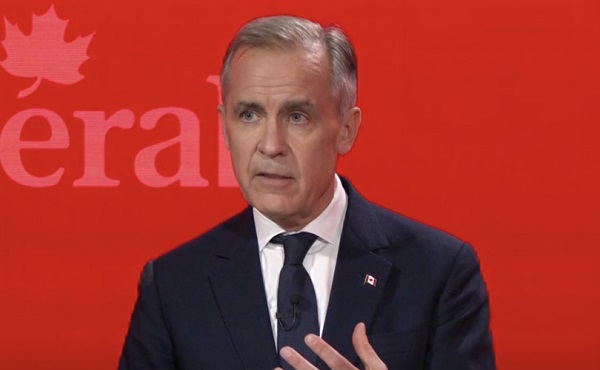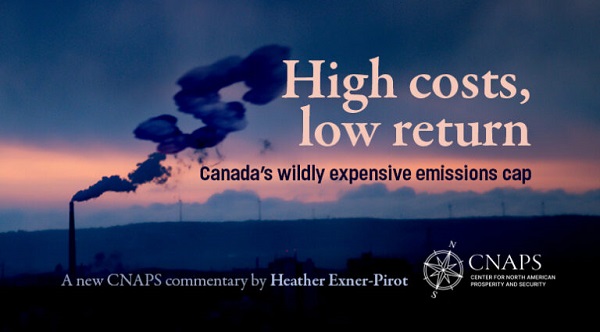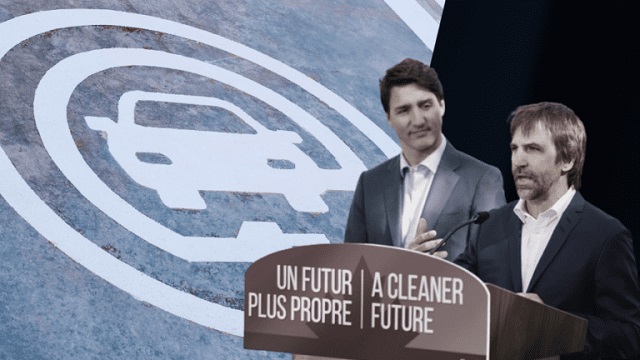Energy
Is the Carney Government Prepared to Negotiate a Fair Deal for the Oil, Gas and Pipeline Sectors

By Jim Warren
Call me a cockeyed optimist but before giving up entirely on the country or selling our energy shares we might want to wait a while to see what a Carney led government actually does.
That being said, lowering the collective blood pressure on the prairies will require answers to some key questions.
Is Mark Carney serious about getting more oil and gas to Canadian tidewater? Does Carney really think this can be done without altering Bill C-69 and ditching the tanker ban, Bill C-48? Is he actually going to leave the emissions cap on oil production, the industrial carbon tax and the clean electricity standard in place, or is he planning to pleasantly surprise us?
Notwithstanding Carney’s penchant for resumé inflation he appears to be a reasonably intelligent guy and a shrewd investor, who understands how national economies work. Assuming this is the case, Carney’s pledge to get more oil and gas exported to customers besides the US may not have been an insincere sop to voters in the West. If so, is he still naïve enough to think pipelines can be built without dismantling the barriers put up by the Trudeau Liberals to block development and stifle growth in the oil and gas sector?
Were his platitudes about zealously protecting the environment and drastically cutting emissions simply an effort to appease the left wing of the Liberals’ electoral base? Will he accept that the radical green agenda outlined in his 600 hundred page door stopper book needs to be put on the back burner during these economically challenging times?
It seems reasonable to imagine Carney was loathe to make too nice with the oil and gas industry prior to the election lest he alienate the Liberal caucus members whose support he needed to win the party’s leadership. Similarly, keeping some of the Liberals’ most radical environmentalists such as Steven Guilbeault out of cabinet could have caused unnecessary embarrassment and friction within the party during the actual election campaign.
Now that he has produced an election win that was nowhere in sight before he became the front runner for the Liberal leadership, Carney is relatively unassailable. True, he can’t be so exceedingly arrogant and dictatorial that he inspires caucus members to cross the floor of the Commons. What is more likely is that those members of the Liberal caucus with the capacity to face reality understand they were headed for political oblivion before Carney came to the rescue. It was he, not them, who secured the victory. They owe him their political lives. This provides Carney with considerable freedom of action when it comes to setting the policy agenda.
He can do some of the things he said he wouldn’t do and refrain from doing others he said he would do. For the Liberals’ communications professionals, explaining why Carney changed his positions from the wrong side of the oil, gas and pipeline debates to the right side should be nowhere near as challenging as the 24/7 turd polishing they had to do for Justin Trudeau.
Yes, the Carney government is currently enjoying its honeymoon period. For a brief while the Liberals get to feel like they are ten feet tall and politically bullet-proof. While his caucus is guzzling champagne and dividing the spoils Carney has the opportunity to plot the policy trajectory of his government.
If Mark Carney really is even half as smart as advertised he knows how important a thriving oil and gas sector (provided with new export pipelines) is to Canada during this time of geopolitical uncertainty and international economic turmoil. Our new prime minister might also appreciate now is not the time to impose inflationary environmental protection and green transition initiatives on the country.
This is not to say Carney ‘deserves a chance’ to show us what he can do. He’s not some sad little fellow whose been warming the bench on a kiddies soccer team hoping for a chance to play. When Mr. Carney entered the game his campaign assured us he is an internationally acclaimed economic wizard capable of running large and important organizations. Now he needs to walk the talk—it’s his job after all.
The point is, there needs to be a long enough pause in East-West political hostilities to see if meaningful cooperation is possible. Should they choose to do so, the producing provinces have the ability to make governing the country much more challenging than it is already. But the prudent approach at the moment is to see what the new prime mister is prepared to negotiate before sending the convoys East. We can still hold the prime minister’s feet to the fire without torching the bargaining table.
This doesn’t mean the country can spend a lot of time making key decisions. The producing provinces and their conventional energy industries have endured a nine year Liberal assault on their ability to generate economic growth. The Trudeau government trampled the rights of the provinces to develop and market their resources. Much has been made of the investment stifling effects of the uncertainty created by the Trump administration’s tariff policies. Nine plus years of uncertainty about the future of Canada’s conventional energy sector has similarly discouraged investment.
There is a wide open policy window available to Canada’s oil, gas and pipeline industries just now. The stars are aligned as well as they’ll ever be for repairing the damage done by the Trudeau Liberals. The strategic importance of being able to market our gas and oil into countries besides the US has never been clearer to Canadians. A majority of people from across the country (74%), including 60% of Quebecers currently favour the building of new oil and gas pipelines extending from the prairies to the east and west coasts.
Yes, at this point in time, the glass is actually more than half full when it comes to making public policy beneficial to the conventional energy sector and the producing provinces. Admittedly, it took a couple of days cooling off after the election results came in for me to say this.
Unfortunately, policy windows don’t stay open forever and the West is urgently seeking change. Federal-provincial negotiations on the conventional energy and pipeline files need to start now. And if the parties are truly concerned about optimizing Canada’s economic prospects and fostering national unity we have every right to expect positive results by mid-summer.
Alberta
High costs, low returns – Canada’s wildly expensive emissions cap

In this new commentary, Director of Energy, Natural Resources, and Environment Heather Exner-Pirot reveals why the Canadian government’s oil and gas emissions cap isn’t just expensive – it’s economic insanity.
Canada is the world’s third-largest exporter of oil, fourth-largest producer, and top source of imports to the United States. Much of Canada’s oil wealth is concentrated in the oil sands in northern Alberta, which hosts 99 percent of the country’s enormous oil endowment: about 160 billion barrels of proven reserves, of a total resource of approximately 1.8 trillion barrels. This is the major source of oil to the United States refinery complex, a large part of which is optimized for the oil sands’ heavy oil.
Reliability of energy supply has remerged as a major geopolitical issue. Canadian oil and gas is an essential component of North American energy security. Yet a proposed cap on emissions from the sectors promises to cut Canadian production and exports in the years ahead. It would be hard to provide less environmental benefit for a higher economic and security cost. There are far better ways to reduce emissions while maintaining North America’s security of energy supply.
The high cost of the cap
In 1994 a Liberal federal government, Alberta provincial conservative government and representatives from the oil and gas industry, working together through the national oil sands task force, developed A New Energy Vision for Canada. Their efforts turned what was then a middling resource into a trillion dollar nation-building project. Production has increased tenfold since the report came out.
The task force acknowledged the need for industry to “put its best efforts toward … reducing greenhouse gas emissions.” However, it also expected governments to “understand” that there “is no benefit to Canada or to the environment to have production and value-added processing done outside of the country in less efficient jurisdictions … policies set by regulator must not result in discouraging oil sands production.”
As part of its efforts to meet its climate goals under the Paris Accord, the Canadian government proposed a regulatory framework for an emissions cap on the oil and gas sector in December 2023. It set a legally binding limit on greenhouse gas emissions, targeting a 35 to 38 percent reduction from 2019 levels by 2030 for upstream operations, through regulations to be made under the Canadian Environmental Protection Act, 1999 (CEPA).
The federal government has not yet finalized its proposed regulations. However, industry experts and economists have criticized the current iteration as logistically unworkable, overly expensive, and likely to be challenged as unconstitutional. In effect, this policy layers a cap-and-trade system for just one sector (oil and gas) on top of a competing carbon pricing mechanism (the large-emitter trading systems, often referred to as the industrial carbon price), a discriminatory practice that also undermines the entire economic rationale of a carbon pricing system.
While the Canadian government has maintained that it is focused on reducing emissions rather than production – the latter of which would put it at odds with provincial jurisdiction over non-renewable resources – a series of third party analyses as well as the Parliamentary Budget Office’s own impact assessment find it would indeed constrain Canadian oil and gas production. The economic cost of the emissions cap far exceeds any corresponding benefit in reduced emissions.
How much will the emissions cap cost in terms of dollar per tonne of carbon in avoided emissions, both domestically and globally? Based solely on the cost to the Canadian economy, we estimate the emission cap is equivalent to a C$2,887/tonne carbon price by 2032.
Assuming no impact on global demand and full substitution by non-Canadian crudes, it finds that the cost of each tonne of carbon displaced globally is between C$96,000 to C$289,000 for oil sands bitumen production. For displaced Canadian conventional and natural gas, the cost is infinite, i.e. global emissions would actually be higher for every barrel or unit of Canadian oil and gas displaced with competitor products as a result of the emissions cap.
Canadian oil and gas emissions reduction efforts
The oil and gas sector is the highest emitting economic sector in Canada. However, it has made substantial efforts to reduce emissions over the past two decades and is succeeding. Absolute emissions in the sector peaked in 2014, despite production growing by over a million barrels of oil equivalent since (see Figure 1).
 Figure 1 Indexed greenhouse gas (GHG) emissions (and gross domestic product (GDP) at basic prices, for the oil and gas extraction industry, 2009 to 2022 (2009 = 100). Source: Statistics Canada 2024.
Figure 1 Indexed greenhouse gas (GHG) emissions (and gross domestic product (GDP) at basic prices, for the oil and gas extraction industry, 2009 to 2022 (2009 = 100). Source: Statistics Canada 2024.
Much of this success can be attributed to methane capture, particularly in the natural gas and conventional oil sectors, where absolute emissions peaked in 2007 and 2014 respectively.
Since 2014, the oil sands have dramatically increased production by over a million barrels per day, but at the same time have reduced the emissions per barrel every year, leaving the absolute emissions of the oil and gas sector relatively flat. The oil sands are performing well vis-à-vis their international peers, seeing their emissions per barrel decline by 30 percent since 2013, compared to 21 percent for global majors and 34 percent for US E&Ps (exploration and production companies) (see Figure 2).
 Figure 2 Indexed Oil Sands GHG relative intensity trend (2013=100). Source: BMO Capital Markets, “I Want What You Got: Canada’s Oil Resource Advantage,” April 2025
Figure 2 Indexed Oil Sands GHG relative intensity trend (2013=100). Source: BMO Capital Markets, “I Want What You Got: Canada’s Oil Resource Advantage,” April 2025
On an emissions intensity absolute basis, the oil sands have significantly outperformed their peers, shaving off 25kg/barrel of emissions since 2013 (see Figure 3) and more than 65kg/barrel since the oil sands task force wrote their report in 1994.
As emissions improvements from methane reductions plateau, the oil sands are likely to outperform their conventional peers in emissions per barrel reductions going forward. The sector is working on strategies such as solvent extraction and carbon capture and storage that, if implemented, would reduce the life-cycle emissions per barrel of oil sands to levels at or below the global crude average.
 Figure 3 Emissions intensity absolute change (kg CO2e/bbl) (2013–24E) Source: BMO Capital Markets, 2025
Figure 3 Emissions intensity absolute change (kg CO2e/bbl) (2013–24E) Source: BMO Capital Markets, 2025
The high cost of the cap
Several parties have analyzed the proposed emissions cap to determine its economic and production impact. The results of the assessments vary widely. For the purposes of this commentary we rely on the federal Office of the Parliamentary Budget Officer (PBO), which published its analysis of the proposed emissions cap in March 2025. Helpfully, the PBO provided a table summarizing the main findings of the various analyses (see Table 1).
The PBO found that the required reduction in upstream oil and gas sector production levels under an emissions cap would lower real gross domestic product (GDP) in Canada by 0.33 percent in 2030 and 0.39 percent in 2032, and reduce nominal GDP by C$20.5 billion by 2032. The PBO further estimated that achieving the legal upper bound would reduce economy-wide employment in Canada by 40,300 jobs and full-time equivalents by 54,400 in 2032.
 Table 2 Comparison of estimated impacts of the proposed emissions cap in 2030. Source: PBO 2025
Table 2 Comparison of estimated impacts of the proposed emissions cap in 2030. Source: PBO 2025
However, the PBO does not estimate the carbon price per tonne of emissions reduced. This is a useful metric as Canadians have become broadly familiar with the real-world impacts of a price on carbon. The federal government quashed the consumer carbon price at $80/tonne in March 2025, ahead of the federal election, due to its unpopularity and perceived impacts on affordability. The federal carbon pricing benchmark is scheduled to hit C$170 in 2030. ECCC has quantified the damages of a tonne of carbon dioxide – referred to as the “Social Cost of Carbon” – as C$294/tonne.
Based on PBO assumptions that the emissions cap will reduce emissions by 7.1MT and reduce GDP by $20.5 billion in 2032, the implied carbon price is C$2,887/tonne.
Emissions cap impact in a global context
Even this eye-popping figure does not tell the full story. The Canadian oil and gas production that must be withdrawn to meet the requirements of the emissions cap will be replaced in global markets from other producers; there is no reason to assume the emissions cap will affect global demand.
Based on life-cycle GHG emissions of the sample of crudes used in the US refinery complex, Canadian oil sands produce only 1 to 3 percent higher emissions than a global average[1] (see Figure 4), with some facilities producing lower emissions than the average barrel.
 Figure 4 Life Cycle GHG emissions of crude oils (kg CO2e/bbl). Source: BMO Capital Markets 2025
Figure 4 Life Cycle GHG emissions of crude oils (kg CO2e/bbl). Source: BMO Capital Markets 2025
As such, the emissions cap, if applied just to oil sands production, would only displace global emissions of 71,000 to 213,000 tonnes (1 to 3 percent of 7.1MT). At a cost of C$20.5 billion for those global emissions reductions, the price of carbon is equivalent to C$96,000 to C$289,000 per tonne (see Figure 5).
 Figure 5 Cost per tonne of emissions cap behind domestic carbon all (left) and post-global crude substitution (right)
Figure 5 Cost per tonne of emissions cap behind domestic carbon all (left) and post-global crude substitution (right)
For any displaced conventional Canadian crude oil or natural gas, the situation becomes absurd. Because Canadian conventional oil and natural gas have a lower emissions intensity than global averages, global product substitutions resulting from the emissions cap would actually serve to increase global emissions, resulting in an infinite price per tonne of carbon.
The C$100k/tonne carbon price estimate is probably low
We believe our assessment of the effective carbon price of the emissions cap at C$96,000+/tonne to be conservative for the following reasons.
First, it assumes Canadian heavy oil will be displaced in global markets by an average, archetypal crude. In fact, it would be displaced by other heavy crudes from places like Venezuela, Mexico, and Iraq (see Figure 4), which have higher average emissions per barrel than Canadian oil sands crudes. In such a circumstance, global emissions would actually rise and the price per carbon tonne from an emissions cap on oil sands production would also effectively be infinite.
Secondly, emissions cap impact assumptions by the PBO are likely conservative. Those by ECCC, based on a particular scenario outlook, are already outdated. ECCC assumed a production loss of only 0.7 percent by 2030, with oil sands production hitting approximately 3.7 million barrels (MMbbls) per day of bitumen production in 2030. According to S&P Global analysis, that level is likely to be hit this year.[2]
S&P further forecasts oil sands production to reach 4.0 MMbbls by 2030, or about 300,000 barrels more than it produces today. This would represent a far lower production growth rate than the oil sands have experienced in the past five years. But assuming the S&P forecast is correct, production would need to decline in the oil sands by 8 percent to meet the emissions cap requirements. PBO assumed only a 5.4 percent overall oil and gas production loss and ECCC assumed only 0.7 percent, while Conference Board of Canada assumed an 11.1 percent loss and Deloitte assumed 11.5 percent (see Table 1). Production numbers to date more closely align with Conference Board of Canada and Deloitte projections.
Let’s make the Canadian oil and gas sector better, not smaller
The Canadian oil and gas sector, and in particular the oil sands, has a responsibility to do their part to reduce emissions while maintaining competitive businesses that can support good Canadian jobs, provide government revenues and diversify exports. The oil sands sector has re-invested for decades in continuous improvements to drive down production costs while improving its emissions per barrel.
It is hard to conceive of a more expensive and divisive way to reduce emissions from the sector and from the Canadian economy than the proposed emissions cap. Other expensive programs, such as Norway’s EV subsidies, the United Kingdom’s offshore wind contracts-for-difference, Germany’s Energiewende feed-in-tariffs and surcharges, and US Inflation Reduction Act investment tax credits, don’t come close to the high costs of the emissions cap on a price-per-tonne of carbon abated basis.
The emissions cap, as currently proposed, will make Canada’s oil and gas sector significantly less competitive, harm investment, and undermine Canada’s vision to be an energy superpower. This policy will also reduce the oil and gas sector’s capacity to invest in technologies that drive additional emission reductions, such as solvents and carbon capture, especially in our current lower price environment. As such it is more likely to undermine climate action than support it.
The federal and provincial governments have come together to advance a vision for Canadian energy in the past. In this moment, they have the opportunity once again to find real solutions to the climate challenge while harnessing the energy sector to advance Canada’s economic well-being, productivity, and global energy security.
About the author
Heather Exner-Pirot is Director of Energy, Natural Resources, and Environment at the Macdonald-Laurier Institute.
Business
Senator wants to torpedo Canada’s oil and gas industry

From the Fraser Institute
Recently, without much fanfare, Senator Rosa Galvez re-pitched a piece of legislation that died on the vine when former prime minister Justin Trudeau prorogued Parliament in January. Her “Climate-Aligned Finance Act” (CAFA), which would basically bring a form of BDS (Boycott, Divestment, and Sanctions) to Canada’s oil and gas sector, would much better be left in its current legislative oblivion.
CAFA would essentially treat Canada’s oil and gas sector like an enemy of the state—a state, in Senator Galvez’ view, where all values are subordinate to greenhouse gas emission control. Think I’m kidding? Per CAFA, alignment with national climate commitments means that everyone engaged in federal investment in “emission intensive activities [read, the entire oil and gas sector] must give precedence to that duty over all other duties and obligations of office, and, for that purpose, ensuring the entity is in alignment with climate commitments is deemed to be a superseding matter of public interest.”
In plain English, CAFA would require anyone involved in federal financing (or federally-regulated financing) of the oil and gas sector to divest their Canadian federal investments in the oil and gas sector. And the government would sanction those who argue against it.
There’s another disturbing component to CAFA—in short, it stacks investment decision-making boards. CAFA requires at least one board member of every federally-regulated financial institution to have “climate expertise.” How is “climate expertise” defined? CAFA says it includes people with experience in climate science, social science, Indgineuous “ways of knowing,” and people who have “acute lived experience related to the physical or economic damages of climate change.” (Stacking advisory boards like this, by the way, is a great way to build public distrust in governmental advisory boards, which, in our post-COVID world, is probably not all that high. Might want to rethink this, senator.)
Clearly, Senator Galvez’ CAFA is draconian public policy dressed up in drab finance-speak camouflage. But here’s what it would do. By making federal investment off-limits to oil and gas companies, it would quickly put negative pressure on investment from both national and international investors, effectively starving the sector for capital. After all, if a company’s activities are anathema to its own federal regulators or investment organs, and are statutorily prohibited from even verbally defending such investments, who in their right minds would want to invest?
And that is the BDS of CAFA. In so many words, it calls on the Canadian federal government to boycott, divest from, and sanction Canada’s oil and gas sector—which powers our country, produces a huge share of our exports, and employs people from coast to coast. Senator Galvez would like to see her Climate-Aligned Finance Act (CAFA) resurrected by the Carney government, whose energy policy to-date has been less than crystal clear. But for the sake of Canadians, it should stay dead.
-

 espionage2 days ago
espionage2 days agoFrom Sidewinder to P.E.I.: Are Canada’s Political Elites Benefiting from Beijing’s Real Estate Reach?
-

 Bruce Dowbiggin2 days ago
Bruce Dowbiggin2 days agoFUBAR: How Trudeau & Trump Rewrote This Century’s Political Handbook
-

 Business2 days ago
Business2 days agoSenator wants to torpedo Canada’s oil and gas industry
-

 Energy2 days ago
Energy2 days agoWho put the energy illiterate in charge?
-

 Agriculture2 days ago
Agriculture2 days agoUnstung Heroes: Canada’s Honey Bees are not Disappearing – They’re Thriving
-

 espionage2 days ago
espionage2 days agoFBI Buried ‘Warning’ Intel on CCP Plot to Elect Biden Using TikTok, Fake IDs, CCP Sympathizers and PRC Students—Grassley Probes Withdrawal
-

 David Clinton2 days ago
David Clinton2 days agoWhy Are Ontario’s Public Schools So Violent?
-

 Automotive2 days ago
Automotive2 days agoOpposition Conservatives fail in attempt to “Pull the Plug” on Carney’s Electric Vehicle Mandate









